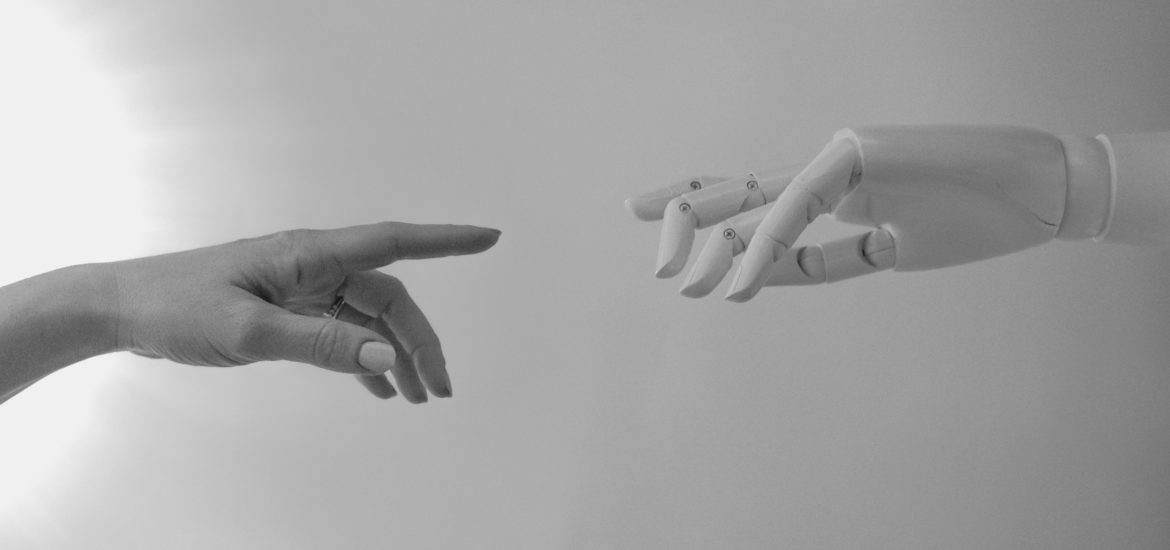“AI is likely to be either the best or worst thing to happen to humanity.”
-Stephen Hawking
Have you ever asked yourself, whether it is humans shaping the future of AI technology or AI technology shaping the future of humans? From having computers with no ability to store data to form the first AI program which could play checkers in 1951 and then to the present advancement of AI technology in almost all spheres, it can be said that artificial intelligence has really grown up!
AI was introduced to bridge the gap created in the path of development due to human limitations and it is doing the job greatly.
So when the whole world decided to fill the gap in development, why should the healthcare department stand back? Well, this led to the introduction of artificial intelligence in healthcare. The first and most significant AI technology introduced in healthcare was MYCIN, which was based on the problem solving ‘Dendral’ designed for organic chemistry application. It was a system that recognised bacteria causing severe infections and also prescribed antibiotics and their dose. It was indeed a great development as it was said that ‘this system could work at par with a human specialist in blood infections and better than general practitioners.’ It was developed in the 1970s and since then, AI in healthcare has not looked back. Today we have so many systems and programs to assist professionals in diagnosing, prescribing and treating diseases.
“We’re at the beginning of a golden age of Al. Recent advancements have already led to inventions that previously lived in the realm of science fiction and we’ve only scratched the surface of what’s possible.”
-Jeff Bezos
There are millions of programs developed for healthcare but some programs are worth mentioning as they hold the capacity to revolutionise healthcare and making systems and processes a lot more efficient.
Here are a few fascinating examples of AI in healthcare!
1.PATH AI
It is based on machine learning technology. This enables pathologists to make an early and accurate diagnosis. Its goals are to reduce errors in cancer diagnosis and develop methods for individualized medical treatment.
2. BUOY HEALTH
It is an AI-based symptom and cure checker. It comprises a chatbot system that listens to the symptoms and problems of patients and gives treatment plans based on the diagnosis it makes. Harvard Medical School is one of the many hospitals that use this program.
3. BIOXCEL THERAPEUTICS
This program aims at finding and developing new medicines for immuno-oncology and neuroscience and also at finding new uses of existing drugs. It was also named “Most Innovative Healthcare AI Developments of 2019.”
4. BENEVOLENTAI
Its primary aim is to provide the right treatment to the right patient at the right time. It also works for developing easily transportable medicines for rare diseases. It is considered the global leader in the development and application of artificial intelligence for drug discovery and development.
5. OLIVE
This system is developed for increasing the efficiency of hospitals as it aims at automating the most repetitive tasks of the healthcare industry from eligibility checks to un-adjudicated claims and data migrations. This frees up the staff so that more attention can be given to patient care.
6. TEMPUS
This AI technology aims at screening the world’s largest collection of clinical and molecular data to personalize healthcare treatments. It is currently using its database for cancer research and treatment.
7. KENSCI
This AI works at predicting clinical, financial and operational risk based on existing data and also predicting from who might get sick to what is driving up the healthcare costs.
8. GOOGLE DEEPMIND HEALTH
This system was developed to make healthcare procedures efficient as it can notify the doctor when a patient’s health deteriorates and can also help in quick diagnosis based on its database.
9. VICARIOUS SURGICAL
It combines virtual reality in AI-enabled robots to make minimal invasion surgeries possible. Using this system the doctor can virtually shrink and explore the insides of a patient’s body in great detail.
10. INTUITIVE
It is the first robotic surgery assistant approved by the FDA over 18 years ago. It helps with minimally invasive surgeries. Its da Vinci platform collects data to provide doctors analytics so that they can improve future surgeries.
Artificial Intelligence In Indian Healthcare System

Image Source: https://analyticsindiamag.com/11-indian-startups-revolutionising-the-healthcare-sector-with-ai/
AI in healthcare for India is a comparatively new field of discussion because even though India has great hospitals and medical professionals, it lacks substantial investment in healthcare. In 2018, NITI Aayog introduced the National Strategy for Artificial Intelligence. The primary goal of introducing AI in the field of healthcare was to solve problems related to access to healthcare for a majority of the population. A major amount has been invested in the development of AI technology in India in the past decade.
The government of India and individual state governments have also signed many contracts with AI startups and companies for the development of systems that can support the healthcare department with a major focus on providing rural healthcare. The development of AI can also help address the problem of disease detection and diagnosis, optimizing the various steps in accessing healthcare, and introducing online platforms to interact with patients.
But, the Indian health scenario is very complicated. So, to make the introduction of artificial intelligence effective and useful, the government and healthcare professionals have to go through a lot of trials and challenges at every stage. The only hope remains that even though the path is tough, it is achievable and promises a very bright future for our healthcare system.
Some Indian startups that have introduced few new developments in this field are:
- NIRAMAI: It has developed an AI and thermal analytics-based system for screening breast cancers at early stages and cost-effectively.
- LYBRATE: It was founded in 2014 and was the first online consultation platform in India. It provides online consultation and has a wide network of doctors throughout the nation. It also has a health consultation bot on Facebook messenger.
- ARTELUS: This AI system can take a retina image, analyze it within 15 seconds and show the result with an accuracy of more than 93%. It aims at assisting doctors with the analysis, prognosis and treatment of diseases.
- SIGTUPLE: This company aims at creating faster diagnostic tools using AI technology so that better primary care and first aid can be achieved.
- ONCOSTEM: It was started in 2011, it uses Genomics-based platforms and Proteomics along with the tool associated with a molecular fingerprint of a tumour, to predict cancer recurrence. It has also developed a system known as CanAssist-Breasts to help in early breast cancer diagnosis.
Many other startups have been working to integrate AI and healthcare positively and effectively for us. But now the question is – To what extent can this artificial intelligence be used?
Probable Challenges Of Using AI in Healthcare
Artificial intelligence has the same relation to intelligence as artificial flowers have to flowers.
– David Parnas
AI technology seemed to be a solution to the various human errors in the field of diagnosis, but no system is error-proof. AI has its own set of errors and challenges. Its working is based on a complex algorithm as a result if a wrong prediction is made by these systems it becomes almost impossible to determine and inspect the reason for the error. Recently, a lot of protests have been seen against this AI technology because quite a lot of people are sceptical about getting diagnosed by a ‘black box’.
Although doctors are not dependent on AI today, if future doctors would start trusting all predictions made by AI and stop cross-checking them, then it can lead to bigger problems. Usually, if a system is trained to diagnose a particular disease, it tends to lean towards that diagnosis only. These systems work on data that they already have, so systems that are built on data from western countries can never work in eastern countries.
One of the biggest problems AI faces is that it can never come at par with human intelligence because of its lack of Emotional Quotient. In the healthcare industry, the whole work depends on the health giver-patient relationship. There are multiple scenarios where patients tend to lie about their disease progression and personal habits, in such conditions it is the role of the doctor to see through these lies and get the truth out of them. This purely depends on instincts, an area where artificial intelligence has not set its feet till now. Another major point is that a doctor or a caregiver provides emotional support and assurance to their patient, which is not provided by any system, program or robot.
AI technology is indeed a very important advancement but in the healthcare sector, the development has still not reached a level where we can depend on these technologies completely. It has reduced the time and energy wasted in a lot of repetitive processes of the hospital making it possible for doctors to depend on more important and clinical work. But in the field of diagnosis, clinicians and doctors remain important because these AI technologies are not errorless and perfect enough to take over human intelligence and emotions. It has a lot of scope for growth and as we have reached this level in recent times, maybe by the end of this decade we will reach a level for artificial intelligence which is completely at par with human clinicians.
As of now, it can be said that artificial intelligence without human supervision is more of a bane than a boon.
References:
https://www.britannica.com/technology/MYCIN
https://builtin.com/artificial-intelligence/artificial-intelligence-healthcare
https://analyticsjobs.in/latest-research/artificial-intelligence-in-healthcare









